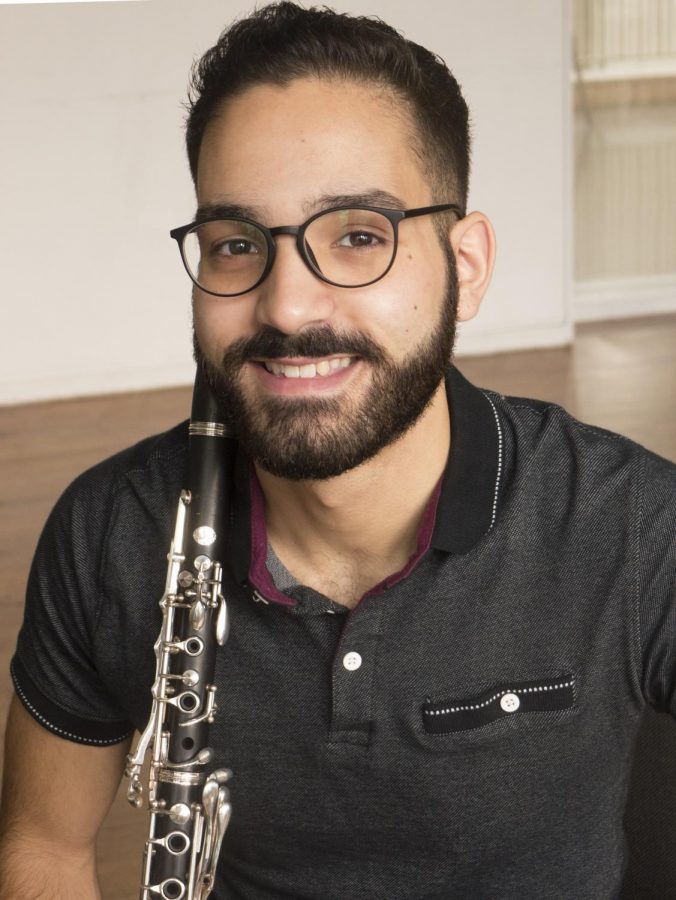Amer Hasan, Third-year Conservatory Clarinetist
Amer Hasan.
Conservatory third-year Amer Hasan is now the clarinet finalist for the 2020 Yamaha Young Performing Artists Competition. Hasan’s mentor is Oberlin Professor of Clarinet Richard Hawkins, who received the same award in 1990. Hasan now serves as the principal clarinetist for the Akron Symphony Orchestra, teaches clarinet at the Grafton Center of Musical Arts, and has already performed and taught in multiple countries. On good days, Hasan says, he plays the clarinet like it’s a part of his body.
This interview has been edited for length and clarity.
What made the clarinet special for you?
I started playing the clarinet in the fifth grade. The middle school band came to my elementary school, and we got to try out all the instruments. I had always been fond of the clarinet because my mom had played it in high school. I always tried to play with it, but not in a musical way — sort of like a toy. Then when I had the opportunity to play the instrument, I was like, “Oh my god, this is so cool, I get to follow in my mom’s footsteps.” She was still an amateur player, so I never thought I would come this far.
When did you realize the clarinet was going to stick with you?
Compared to all the other subjects I was studying, they were never as fun. I had such a great time playing with other people, both in band and in smaller sectionals. That was my favorite time of fifth grade — when the middle school band director would pull the band kids out of class and the few of us would play together. It was nice to communicate through music, even though it was intermediate.
Does the clarinet still remind you of your mom when you play it?
Yeah, it really does.
Would you consider yourself naturally talented or was it 100 percent work?
I don’t think I’m very talented, to be completely honest. There’s a special connection between me and the instrument. It feels right to play it — it’s almost like an extension of my voice. That feeling helped and made me want to practice more. It started my cycle of improving; I heard myself improving, and I liked the way it sounded, so I’m still continuing.
What is it to have an instrument feel like an extension of your body?
I’m still trying to figure that out because it changes every day. The clarinet is made out of wood, so part of the process is finding a way to make it feel like it really is a part of your body. Some days it’s great, like when I practice in Robertson Hall or when I’m performing. But sometimes the weather’s bad and my reeds are changing. It can get frustrating.
Has your mentor Richard Hawkins’ methodology been why you’ve tried to adopt the clarinet this way, or is that something you brought to school with you?
It has definitely come from him. Coming into Oberlin, I was struggling with the idea of making it easy, so that it really felt like part of me. Seeing him and hearing his sound sort of put a sound in my ear. He’s an exceptional model for how he can pick up the clarinet and play one of the most beautiful notes I have ever heard in my entire life.
He treats the clarinet like an object as well. He’s like, “It’s just the clarinet, you should be singing.” If it’s sitting on a music stand, he’ll just pick it up. It’s just a clarinet, right? Then you’re not treating it like it’s a part of your body; you’re treating it like it’s an object, it’s just a tool. There’s these two ideas about it that meld together.
What was your decision-making process behind your repertoire for your junior recital?
The middle piece in the program is the Weinberg Sonata [for Clarinet and Piano]. It’s a World War II-era piece, and it’s very dark, actually. There’s this really awesome klezmer-inspired second movement in the middle. I’ve always wanted to perform it because I don’t think it’s been performed as much as it should be.
I’m also doing Nielsen’s Humorous Bagatelles. They’re these sarcastic pieces that were originally for piano. They also haven’t been performed a lot.
Opposite of that, the last piece on my program is a staple in the clarinet repertoire. It’s one of those pieces that a lot of people will play in high school, so it’s not often heard at the college level. I wanted to bring it to the table because it’s overlooked once people get older.
Do you have a certain career in mind?
Right now, I’m playing with the Akron Symphony Orchestra, and so much of the repertoire is music that, if I were to pursue a career in classical music or as an orchestral musician, it would be my entire life. I’d love to play in an orchestra, and that’s the most financially stable option for a musician. I also absolutely love chamber music, and I definitely want to teach because music has such a profound impact on my life — it would be a shame if I didn’t pass it on. I’m still not entirely sure what life has in store after graduation, but I know that the clarinet will stay with me, and I’ll find my journey after that.











